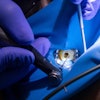Individuals with gum disease may have a higher risk of cardiovascular-kidney-metabolic (CKM) syndrome, highlighting the importance of including oral health as part of cardiometabolic care, reports study findings recently published in Diabetes Research and Clinical Practice.
Furthermore, biological age acceleration (BAA), measured through blood biomarkers, may explain this link, the authors wrote.
“Healthcare providers managing patients with CKM syndrome should consider oral health status as part of comprehensive care,” wrote the authors, led by Xiang Qi of New York University (Diabetes Res Clin Pract, August 25, 2025, Vol. 228, 112437).
The study analyzed data from 3,102 adults ages 30 to 79 using the U.S. National Health and Nutrition Examination Survey (NHANES) 2009 to 2014. Participants were classified as having no, mild, moderate, or severe periodontitis based on clinical attachment loss (CAL) and probing pocket depth (PPD) at interproximal sites, they wrote.
CKM syndrome stage was determined on a five-level scale using published criteria adapted to NHANES data. Biological aging was measured using two composite indices from which BAA was calculated. A positive BAA indicated faster aging than expected for a person’s chronological age, while a negative BAA reflected a biologically younger profile.
The study found a dose-response relationship between periodontitis severity and the CKM syndrome stage. Advanced CKM was present in 13% of participants with no periodontitis, 15% with mild, 20% with moderate, and 26% with severe periodontitis (p < 0.001). In adjusted models, severe periodontitis was linked to 1.5 times higher odds (95% confidence interval [CI]: 1.15 to 1.96, p = 0.003) of being in a higher CKM stage, while moderate periodontal disease carried 1.28 times higher odds (95% CI: 1.07 to 1.53, p = 0.008), they wrote.
Additionally, severe periodontitis was associated with 2.05 times higher odds of advanced CKM (p < 0.001), and each 1 mm increase in CAL or PPD further raised the odds of advanced CKM (odds ratios: 1.12 to 1.28). BAA contributed to this relationship, with mediation analysis showing that BAA explained part of the association.
The study, however, had limitations. The exclusion of adults ages 80 and older may have underestimated the associations and limited the study’s applicability, the authors added.
“These results highlight periodontitis as a relevant factor within the CKM health spectrum and suggest that BAA may serve as a shared pathophysiological link between chronic oral inflammation and cardiovascular, renal, and metabolic systems,” they concluded.




















